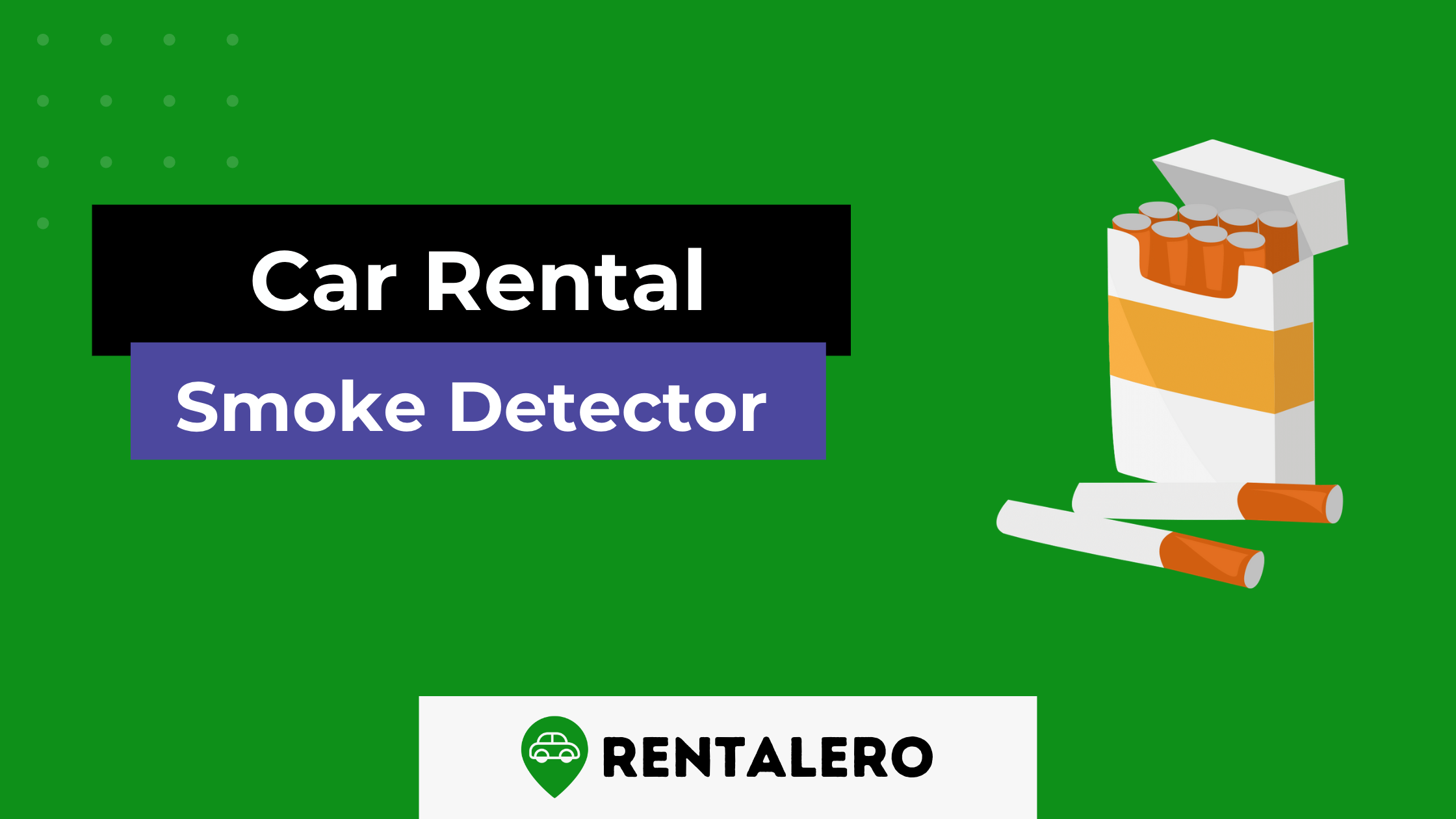Lighting up the age-old debate on smoking in rental cars, there’s a burning question we need to address: the existence of smoke detectors in rental vehicles.
This enlightening article will delve deep into the world of rental cars and their policies on smoking.
We’ll explore the use of smoke detectors in these vehicles, discuss the consequences of smoking in a rental car, and provide you with crucial information to guide your rental car experience.
Advertising links are marked with *. We receive a small commission on sales, nothing changes for you.
Key Takeaways
- Car rentals do not have smoke detectors, but rental car employees are trained to detect smoke.
- Most rental car companies in the US and Canada have smoke-free fleets.
- Violating the smoke-free policy can result in significant fines, potential damage costs, and even a ban from future rentals.
- Smoking in a rental car can also put future renters at risk due to lingering secondhand smoke.
- Respecting the smoke-free policy is a shared responsibility that ensures a pleasant rental experience for everyone.
Do rental cars come equipped with smoke detectors?
You’re planning a road trip and considering renting a car. Among the many questions you might have, one could be, “Do rental cars have smoke detectors?”
It’s a valid question, especially if you’re a non-smoker who wants to ensure a smoke-free environment or perhaps a smoker wondering about the restrictions.
Absence of physical smoke detectors
To directly answer the question, rental cars are not equipped with physical smoke detectors. According to sources like Psychreg, Motor and Wheels, and Homex, there’s no standard provision for smoke detectors in rental cars.
This absence may seem surprising, especially considering how prevalent smoke detectors are in homes, offices, and hotels. However, it’s essential to remember that cars and other motor vehicles present a different environment.
Cars are generally well-ventilated, especially when in motion, which would render a smoke detector far less effective than in an enclosed space like a room.
Why aren’t smoke detectors installed in cars?
The reasons why smoke detectors aren’t installed in cars are multifaceted. Firstly, smoke detectors’ design and primary function cater to indoor environments where smoke can accumulate quickly in a confined space, triggering an alarm.
In contrast, the ventilation within a vehicle, especially while driving, would likely disperse smoke before it reached levels detectable by most standard smoke detectors.
Secondly, the environment inside a car is subject to rapid changes in temperature and humidity, which can affect a smoke detector’s functioning and longevity.
Finally, smoke detectors have sensitive components that may not withstand a car’s broad range of conditions.
Lastly, installing smoke detectors in vehicles might present legal and liability issues. For instance, if a smoke detector fails to alert a driver to a potential fire, the rental company could be held responsible for any damage or injuries.
Maintaining a Smoke-Free Environment
While rental cars don’t come equipped with smoke detectors, that doesn’t mean rental companies are indifferent to smoking in their vehicles.
On the contrary, they are vested in maintaining a smoke-free fleet.
The absence of a physical smoke detector doesn’t mean there’s no way to detect if someone has smoked in the vehicle. The human nose is incredibly sensitive and can often detect traces of smoke long after the act.
How Rental Car Companies Detect Smoke
The absence of physical smoke detectors in rental cars might raise questions about how rental car companies enforce their no-smoking policies. For example, how do they detect if a client has been smoking in their vehicles? The answer lies in human intuition and sensory perception.
The Human Nose: A Powerful Detector
Rental car companies rely on their employees’ olfactory or smell senses to detect smoke in their vehicles. However, the human nose is an incredible biological instrument.
It can differentiate between thousands of different smells and remember them over time. For example, the human nose often outperforms mechanical detectors when detecting smoke.
Training employees to detect smoke
Employees at rental car companies are trained to recognize the distinct smell of smoke. Then, before renting a car to a new customer, it undergoes a thorough cleaning and inspection.
Part of this inspection involves a “smell test.” For example, if an employee detects the smell of smoke, the car undergoes a more intensive cleaning process to remove the smell before it’s rented out again.
This process isn’t just about maintaining a pleasant experience for the next customer. It’s also part of enforcing the company’s no-smoking policy.
If a client returns a car that smells of smoke, they could be liable for a “smoke cleaning fee.” This fee covers the additional cleaning required to remove the smell of smoke and any resulting delay in renting the car out again.
The Limits of the Human Nose
While relying on the human nose to detect smoke has advantages, it’s not a foolproof method. Some people may have a diminished sense of smell, and others may become “nose blind” to certain smells over time.
It also relies on the honesty and integrity of the employees. Nevertheless, it’s a relatively effective method of enforcing a no-smoking policy without physical smoke detectors.
Smoke-Free Fleets
Most rental car companies in the US and Canada have smoke-free fleets. This means all their vehicles are supposed to be free from the smell of smoke.
This policy is not just about providing a pleasant environment for non-smokers. It’s also about preserving the value of the vehicle. Cars that smell like smoke can be harder to sell and may lose value faster.
Consequences of Smoking in a Rental Car
So, you’ve booked a rental car and are about to embark on your journey.
If you’re a smoker, you might wonder what the harm could be from lighting up inside the vehicle. Before you flick that lighter or light that cigarette, it’s essential to understand the potential consequences of smoking in a rental car.
The Smoke-Free Policy
As we’ve already discussed, most rental car companies in the US and Canada enforce a strict smoke-free policy. This policy is communicated to customers when they rent the vehicle, usually through signage within the car and stipulations in the rental agreement.
Remember, this policy isn’t limited to traditional cigarettes. It applies to all types of smoking, including cigars, pipes, and electronic cigarettes.
Penalties for Violating the Smoke-Free Policy
If you violate the smoke-free policy, you’ll likely face penalties. The most immediate consequence is a fine. The cost of this can vary between rental companies, but it can be quite substantial, sometimes running into hundreds of dollars.
The fee is imposed to cover cleaning and deodorizing the vehicle. It can also contribute to any potential loss in the car’s resale value due to it having been smoked in.
Damage to the Vehicle
Smoking can also cause physical damage to the rental car, which could lead to additional costs. For example, cigarette burns on the seats, carpets, or upholstery can be expensive to repair, and the cost will likely be passed on to you, the renter.
Furthermore, ashes can damage the car’s interior, and disposing of cigarette butts inside the vehicle can lead to even higher cleanup costs.
Potential Health Risks to Future Renters
By smoking in a rental car, you could be putting future renters at risk. Secondhand smoke can linger in a vehicle long after the a has been lit.
The harmful chemicals in tobacco smoke can be absorbed into the car’s upholstery and ventilation system. This could affect non-smokers and people with allergies, asthma, or other respiratory conditions who rent the car after you.
Conclusion
Driving through scenic routes in a rental car can be an exciting part of any journey. However, it’s essential to remember that certain responsibilities come with this convenience.
One of these is respecting the smoke-free policy prevalent among rental car companies.
Understanding that car rentals do not have smoke detectors but rely on well-trained employees to detect smoke can help us appreciate the trust placed in us as renters.
Thus, respecting the smoke-free policy is not just a contractual obligation but a step towards ensuring a comfortable experience for future renters and maintaining a healthy relationship with the rental company.
Frequently Asked Questions
What if I accidentally smoked in the rental car without knowing the policy?
Even if you weren’t aware of the policy, you would still be liable for the fine.
Rental companies usually make their smoke-free policy very clear in the rental agreement and through signage in the vehicle. Ignorance of the rule doesn’t exempt you from the consequences.
Can I smoke in the car if I clean it afterward?
No, most rental car companies have a strict no-smoking policy that applies regardless of whether the vehicle is cleaned afterward.
What about vaping or electronic cigarettes? Are they allowed?
Most rental companies include electronic cigarettes in their no-smoking policies. When in doubt, check with the company before you vape in their vehicle.
What happens if the previous renter smoked in the car?
Rental companies thoroughly clean and deodorize their vehicles between rentals. If you suspect a previous renter smoked in the car, report it to the rental company immediately.

Nzoputa has been writing for Rentalero since day one and is one of our most experienced members when it comes to the rental industry. For her, nothing beats Uber!
Advertising links are marked with *. We receive a small commission on sales, nothing changes for you.

